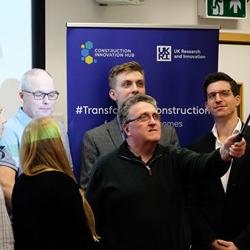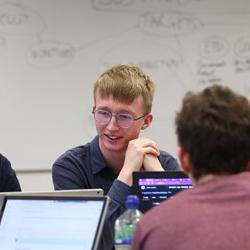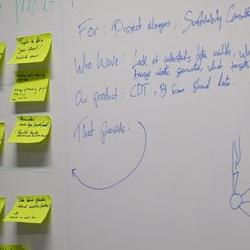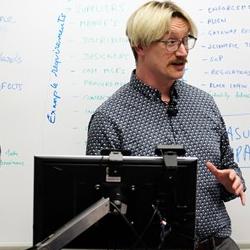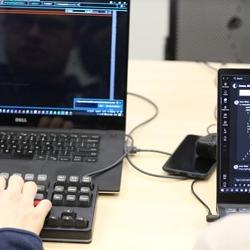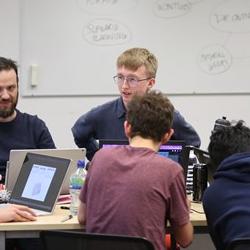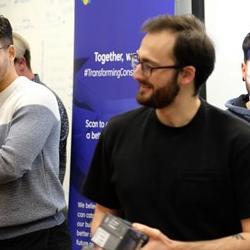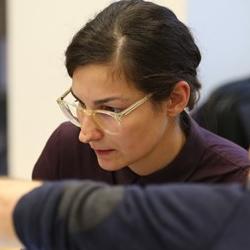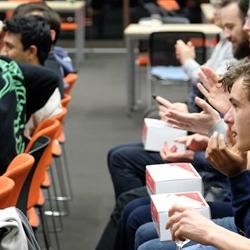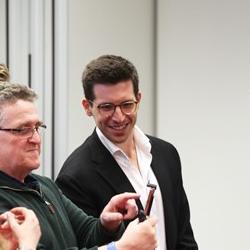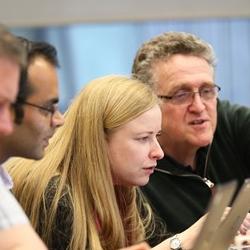
Submitted by Jo Daye on Thu, 24/03/2022 - 09:58
“We’re either a massive brake or accelerator on climate resilience depending on our actions.”
The UK’s built environment, of which the construction sector is a significant component, contributes approximately 40% of our nation’s carbon emissions – with the construction sector alone contributing to 11% of the global emissions total.
Climate change is happening and the impact of it is resonating heavily already. If we stand any chance of slowing down the rapid rate of impact, we – as an industry – must find effective, sustainable solutions to the way we design, manufacture and operate the built environment for the better.
As a partner in the Construction Innovation Hub (the Hub), the Centre for Digital Built Britain (CDBB) has acted as a convener to many collaborative projects over the past four years. We have marvelled at the level of innovation and creative problem-solving that results from bringing together a wide range of individuals with varied skills and knowledge, all sharing a common goal – to make our industry perform better, with more sustainable practices.
Hackathon: a collaborative sprint event where multi-discipline and/or highly specialist teams come together to intensively solve set challenges.
On March 4 2022, CDBB hosted a Hackathon at Anglia Ruskin University in Cambridge. Around 40 people came together to join the highly collaborative approach to problem-solving with additional participants joining remotely for the hybrid event. These ranged from architects to data scientists, infrastructure engineers, researchers and technology consultants.
The day kicked off with a briefing from CDBB’s Head of Information Management, Henry Fenby-Taylor. The objective was clear: to explore ways in which the use of interoperable data could help to make our industry more sustainable and resilient for the future, whilst delivering positive, tangible solutions to managing the impact of climate change. The purpose of the exercise was to provide an answer to the question:
Can Data Save The World?
Participants were grouped into seven working teams and each set about applying their collective skillsets and expertise to develop workable solutions to the industry’s key challenges, as they identified them.
The teams had three fixed themes to focus on when developing their solution:
Sustainable Development – As we continue to build how do we do so more harmoniously with the environment?
Climate Resilience – It’s too late to stop climate change from happening, but how can we mitigate the damage it causes?
Reducing Emissions – How and where do we build to achieve lower emissions output?
Teams had approximately six hours to develop their ideas before presenting them back to the judges, and wider group, at the end of the day. Judging criteria considered how closely the solutions were aligned to the themes and whether teams had achieved the following output criteria:
- Application
- Visualisation
- Guidance
- Opportunities
The event was an undeniable success, with teams demonstrating their creative, insightful and remarkable talents for problem-solving, as well as their commitment to working collaboratively. It also helped g to strengthen the industry community – by bringing together parties that often operate at arm’s length to each other, or don’t communicate at all, the event helped everyone to realise that the challenges they face are often shared and similarly that they share a desire to overcome them and improve ways of working.
At the end of the day, the teams reconvened and each team was given five minutes to present their idea. As the hackathon was a competitive format, there were prizes awarded for ideas that aligned most closely to each of the three themes, and further prizes awarded for Creativity and Functionality of the ideas.
We are also hopeful that the ideas and connections made at the event will continue to have an impact in the longer term. For example, the team from Travis Perkins are looking to develop the concepts from the hackathon as part of their innovation strategy and the Promoting Success team saw opportunities for developing sustainability data points as part of their work for the Construction Data Trust.
THE RESULTS
Sustainable Development Prize
Winners: Team FIBE
Problem: How do we make building more sustainable, knowing that we have to reduce, recycle and reuse. How can buildings be made and managed with less impact on the environment.
Idea: A web-based app generating ‘building passports’ that help to keep track of a building’s updates and repairs, improving the whole life cycle analysis of a built asset.
Climate Resilience Prize
Winners: Team Hammer Heads
Problem: The issue of excessive waste in the construction industry, and as a product of that trying to reduce emissions.
Idea: Creation of a standardised data collection platform/app that construction companies use to input data about their generated waste. This feeds into the Construction Data Trust and the output is a live-updating dashboard presenting an overview of how they compare to other companies within industry, and where there’s room to improve.
Reducing Emissions Prize
Winners: Team London
Problem: How data can be used to determine which areas are better suited to hydrogen conversion.
Idea: Using data to create a digital heat map of the UK highlighting the areas most suitable for transition to hydrogen-run homes based on the current state of readiness. A tool for supporting the implementation of Government’s Hydrogen Strategy.
Creativity Prize
Winners: Team Building For Better
Problem: Lack of trustworthy data undermining progress of the sustainable built environment.
Idea: A standardised approach to data collection and sharing that helps to reduce fabrication of data, build trust and encourage adherence to industry standards.
Functionality Prize
Winners: Team Accountable Futures
Problem: How can new builds achieve net-zero?
Idea: Creation of an open-source, online platform that assigns sustainability scores (and compares them) across products. Provides a database of products (eg: concrete) that is searchable by priority fields (eg: cost, material etc).
We would like to extend heartfelt thanks to everyone who helped to organise and take part in our ‘Can Data Save The World?’ hackathon event. What we learned is that data alone won’t save the world by Itself, but the collective power of people combined with innovative thinking AND data can set us on the right path to save the world.
CDBB’s purpose to drive forward the digitalisation of the built environment to create a better future for people and the planet will only be achieved if we, as an industry, work together collaboratively to solve our key challenges. As this hackathon event demonstrated, by bringing a rich mix of skills and experience together creative and innovative thinking is sparked, and smart, workable solutions can be arrived at within a short timeframe. The industry needs to continue to work collaboratively, transparently and with open minds if we want to create a more sustainable and resilient construction sector for the future.

